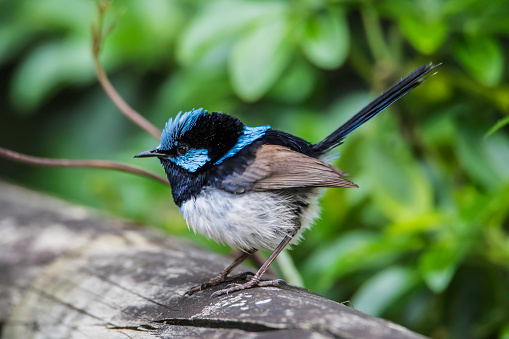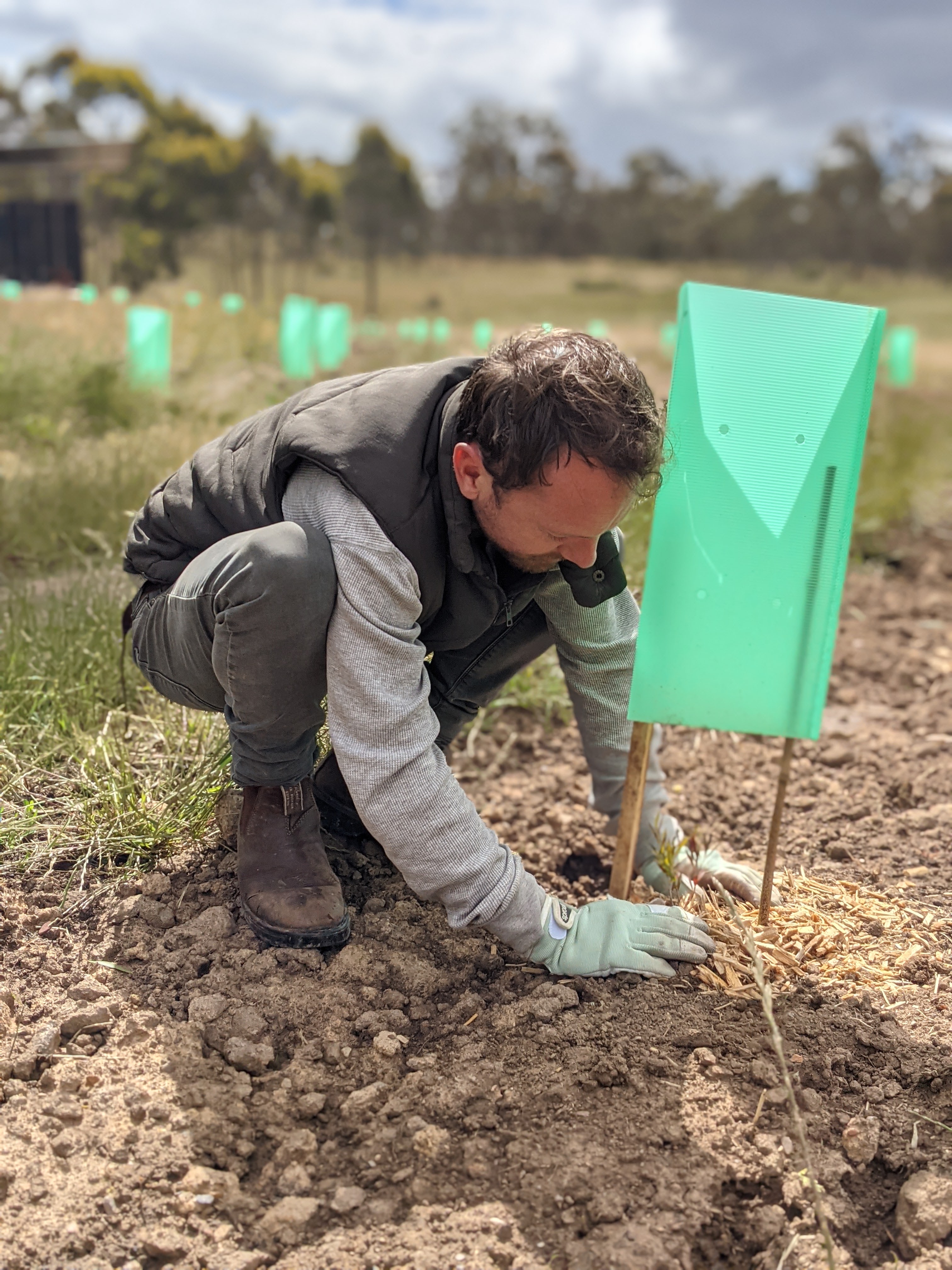December 21, 2023
|
Collective action is good for the planet.
TREES PLANTED
2,430
Trees for individuals are adding up. Over the course of the year, one hundred and twenty-five (130) kind-hearted souls purchased trees for us to plant on their behalf. Trees to cover the carbon footprint of their flights, trees to cover the carbon footprint of their cars, trees as gifts, trees in memory of a loved one and now trees as gifts for Christmas.
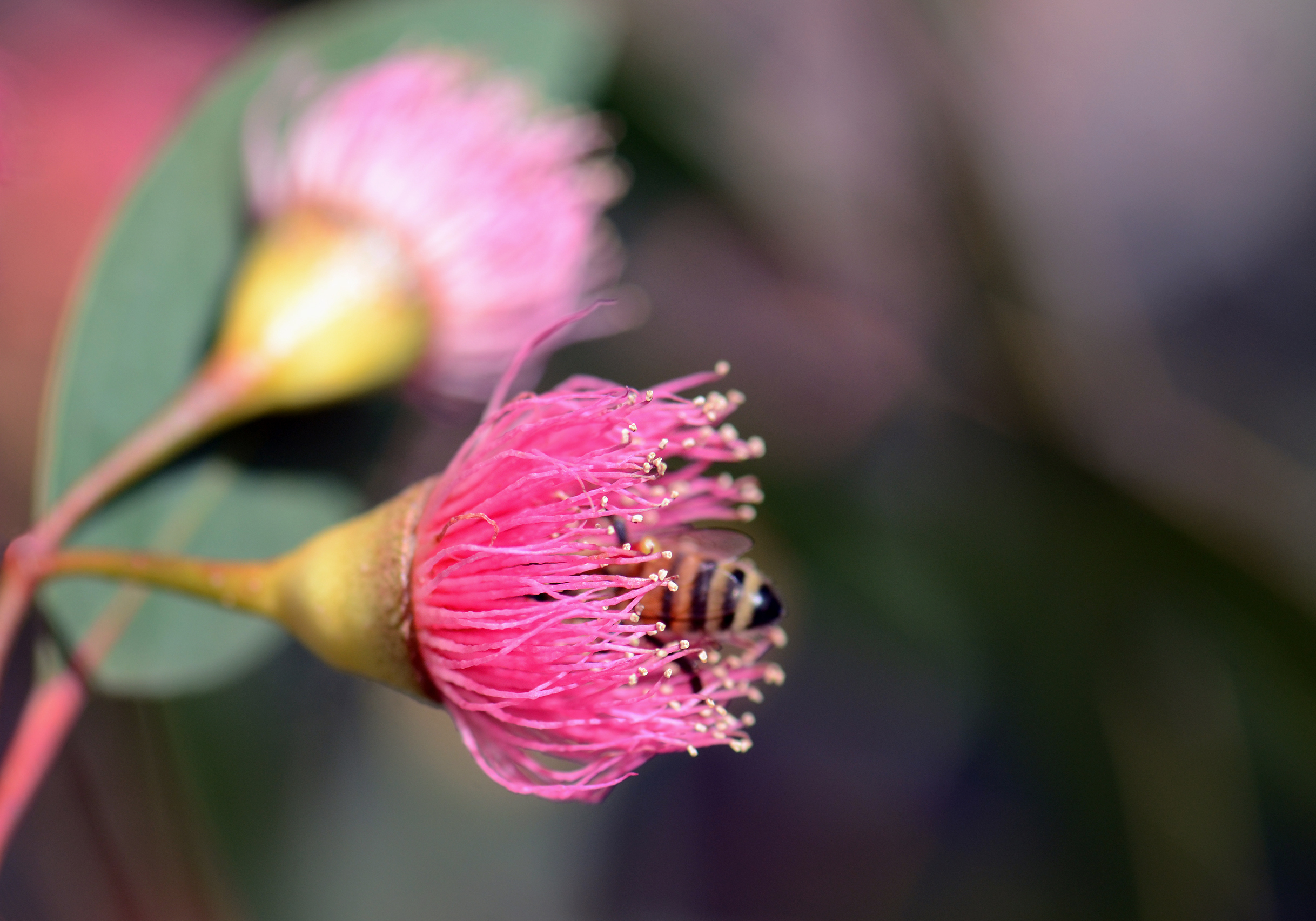
Individual actions become collective actions and the number add up. And the proof is here! This year, to date, we have planted over 2,400 native trees thanks to the generous souls below.
Planting trees for Christmas gifts.
Marking this occasion by giving a gift of trees is a present both for the receiver and the planet. A sustainable gift that will keep growing for many years.
- Georgia Radford for her Nan Wendy Radford. ‘Happy Christmas Climate Queen. Love Gg’. (6 trees).
- Elissa Goodrich for Ron & Ann Goodrich. (15 trees)
- Bronwyn Blaiklock for daughter. ‘Wishing my daughter, Grace Hudspith, much joy and love on her 12th Christmas and every day. Hugs, Bronwyn Blaiklock’. (15 trees)
- To Grade 5 teacher extraordinary Mr Tim Arnold. ‘Thank you Mr Arnold from Y5A 2023′.
- To Sally Ann from Sue Woodward. (15 trees)
- From Karen Felstead. ‘Merry Christmas to the Felstead family. A gift for you. Fifteen trees will be planted to help our planet. Love K and M xxx’ (15 trees)
Planting trees in memory of a dearly loved one.
There is no doubt that profound changes follow the loss of someone dear to us. Planting a sapling in their memory can create new connections to them as it continues to grow and provide habitat for local fauna. The act of planting a memorial tree brings with it a sense of purpose and hope for the future.
- Richarda for her father Andy. (45 trees)
- David Braun purchased trees in memory of Mrs Nirmal Ghumman. ‘Nirmal was a keen gardener, and she would always prefer a plant to nurture and have the joy of seeing it grow and flower, rather than receive flowers (which fundamentally are more transient), hence this gift‘. (15 trees)
- Colleen and Albert Filippa, these trees are in memory of Ron Broom. ‘So sad to hear that Ron had died, all our love and sincere condolences to his loving family‘. (15 trees)
- Trees in memory of colleague’s mother at the G.J.Gardner Melbourne Inner NW. (15 trees)
- Greg Stewart in memory of Terry Ryan. ‘A beautiful man, loving partner Barb Robertson, passionate glider pilot’. (15 trees)
- Teresa Fae in memory of Antonio (Tony) Fae. (45 trees)
- Chris Fox in memory of Bianca Guidici. ‘In memory of my mother Bianca Giudici (1930-2019) who found herself hiking and loved being immersed in the grandeur of the Grampians many, many times over her lifetime’.
- Shenaaz for her father. ‘Dad recently passed away from cancer here in Brisbane, he would have liked this as he loved our natural environment, it was his happy space‘. (15 trees)
- Anne E Stewart in memory of Rod May (15 trees)
Rod was one of Australia’s ecological farming pioneers, 4th generation farmer at Blampied Victoria, he was an early adopter of organic farming, merging it with permaculture principles. He started the Central Victorian Tree Planting Co-op and was founding president of NASAA (organic certifying agency). It is six years since his passing and he is missed by us all, especially his beloved daughters Stephanie and Carla. August 11th is his birthday and these 15 trees are to commemorate a great man.
- Cynthie Manson for her friend Lynette Maynard. (15 trees)
Sprinklers of Sparkles, a sonnet sways surrounding, stays.
A movement, moments, and memories, of mothers, don’t mourn.
Living, loving, lasting, leaving a legacy lane.
Forever formed, fruitful, fantastic and fervently framed.
Thank you to the following who each have purchased 15 trees.
- Narelle Phipps
- Avril Moore
- Samantha Rodgers
- Amy Robinson
- Jennifer Lanham
- Dorothy for her son’s (Dean) birthday.
- Hannah Maiid
- Leela Lewis
- Amy Stapleton is purchasing trees as she sells her beautiful artwork at Amy Stapleton Art.
- David Turnbull
- Lee Nash
- Ben Ten, who has purchase these trees on the behalf of the Satellite Foundation for Clare MacDonald.
- Elissa Goodrich, who purchased the trees as a gift for Ron and Ann.
- Ellisa Goodrich
- Amy Robinson
- Emily Wagner purchased these trees as thank you gifts for the participants at the International Women’s Day event at RMIT University Library.
- Madeline Edwards, purchased these trees as a gift for her sister’s (Beth) birthday.
- Megan Upton
- Amy Robinson
- Jennifer Lanham
- Germain Briandf
- Llewellyn Wishhart
- Magan Barrett
- Lexie Wood
- Laura May Grogan who purchased these trees to help reduce the carbon footprint of her entry in the ShitBox 2023 Rally
- Deborah Karmouche
- Philip Giddings
- Catherine Middleton
- Steven Broussos
- Shannon Haintz
- Richard Halford
- Bronwyn Blaiklock
- Marion Mortimer
- Alex Pritchard
- Beverly McGain
- Ketsia Sellars
- Amy Robinson
- Tom Lewis
- Natalie Atherden
- Frances Gass
- Helen Winter
- Richarda for Andy
- Alex Pritchard
- Jennifer McDonald on behalf of Oatley West Public School, NSW and The Green Gazette.
- Jan Souter
- Elissa Goodrich for Ann Goodrich as a birthday gift
- Shenaaz Hoosein
- Kathy Reid
- Jade Goodfellow
- Tan Tiep Phan
- Chris Fox for Amy Fox. ‘These trees are for my daughter Amy, who adores being revitalised in our natural garden and, sadly has the future of our planet on her shoulders’.
- Amy Stapleton.
Thank you to those who purchased 30 trees.
- Jenny Kan
- Caroline Ferris
- Jolyon Blazey
- Phillip Sherlock
- Mariano Ramirez
- Alexandra Shiga
- Loretto College students who raised funds for these trees by selling hot chocolate
- David Symons
- Russell Bruechert
- Helen Lawson
- Polly Bastow
- Carol Anderson
- Lewis Mitchell
- Belinda Forsyth
- Helen Grutzner
- Alex Pritchard
- Fern Hames purchased 30 trees for her daughters wedding. One tree for every guest attending. Congratulations Hannah and Tom.
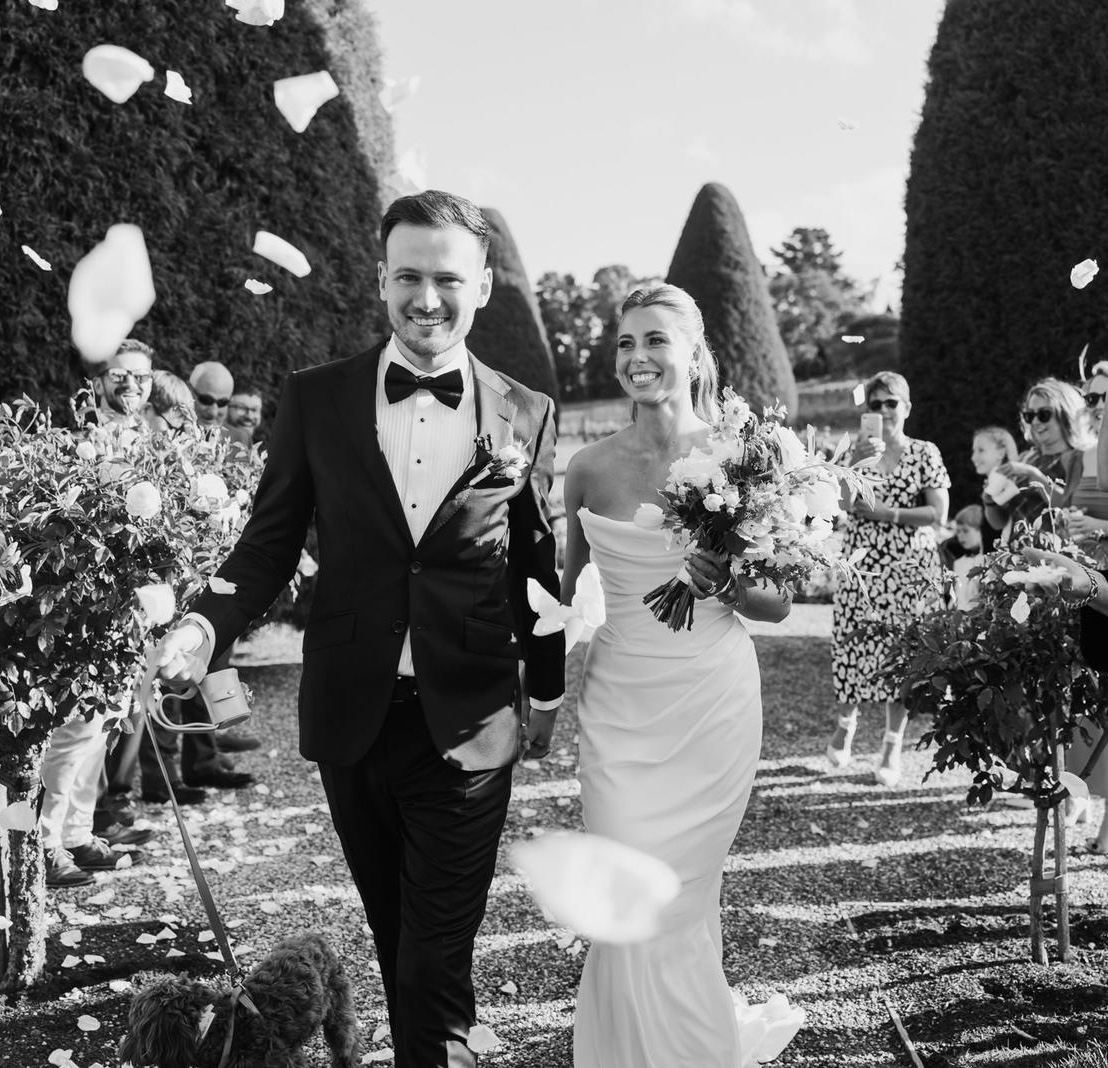
- McCuskey-Gwyther family.
To the fabulous ICU and Ward 3South of Grampians Health Ballarat (Ballarat Base), the ambos, nurses, doctors, hospitality, reception, cleaners, carers and volunteers – all of you fabulous people.
Thank you for fronting up for me at one of the worse moments of my life. Thank you for taking care of our precious Mick who faced a life threatening situation in the middle of a dark cold stormy night. Thank you for standing by us at the moment I saw death sitting on the body of the man I have loved forever. Thank you for asking me difficult questions and for telling me the truth of what it was we were facing.
Thank you for taking care of the family that traipsed in exhausted, fearful and anxious for what was to come. You saw us at our most vulnerable, you hugged us when we were alone and you talked to us when we had numerous questions that all needed answers at once.
Out of the dark woods now and turning onto the road to recovery we can see clearly now how hard you worked to get us on the road. Thank you.
Thank you to those who purchased 45 trees.
- Helen Pritchard
- Michael Inouye
- Jessica Wilson to help reduce the carbon footprint of her flights to the UK
- Clarissa Johnson (+ 5 from us) in celebration of her parent’s 50th wedding anniversary
- Ballarat Action Climate Co-Op
Thank you to those who purchased 50 trees.
- Plenty Valley PVCC (50 trees)
Thank you to those who purchased 60 trees.
- Sarah and Brent Allan
Thank you to the St Brigidine Sisters.
- Brigidine Association (10 trees)
- Sr Rosemary Kerr (15 trees)
- The Malvern Community (15 trees)
- Sr Julia Williams (15 trees)
- The Bon Beach Community (15 trees)
- The Ardeer Community (60 trees)
- Sr Anne Boyd (60 trees) RIP
And finally, thank you to those who purchased trees to help reduce the carbon footprint of their flights.
- Megan Utter (6 trees)
- Barb and Chris Bellesini (10 trees)
- John O’Neill (24 trees)
- Elizabeth Boulton (24 trees)
- Rebekah Lo (40 trees)
- Lena Mazza (60 trees)
- Louisa Bear/Mable (80 trees)
- Dani Curcio and Richard (45 trees)
- Douglas Proctor (60 trees)
Site A | Bendigo Creek Streamside Reserve | 540 trees
These trees are forming part of regeneration and habitat projects where they will grow to stabilise soil, provide shade and food to native fauna, and encourage biodiversity.
The trees were planted during a community event within the Bendigo Creek Streamside Reserve on Djaara country. The site is significant to Northern Bendigo Landcare Group because it is part of their Bendigo Creek Habitat Restoration Project. This Project is ongoing, indeed the group have been working on it for the past 10 years. Their aim is to boost the ailing Creekline Grassy Woodland vegetation community.
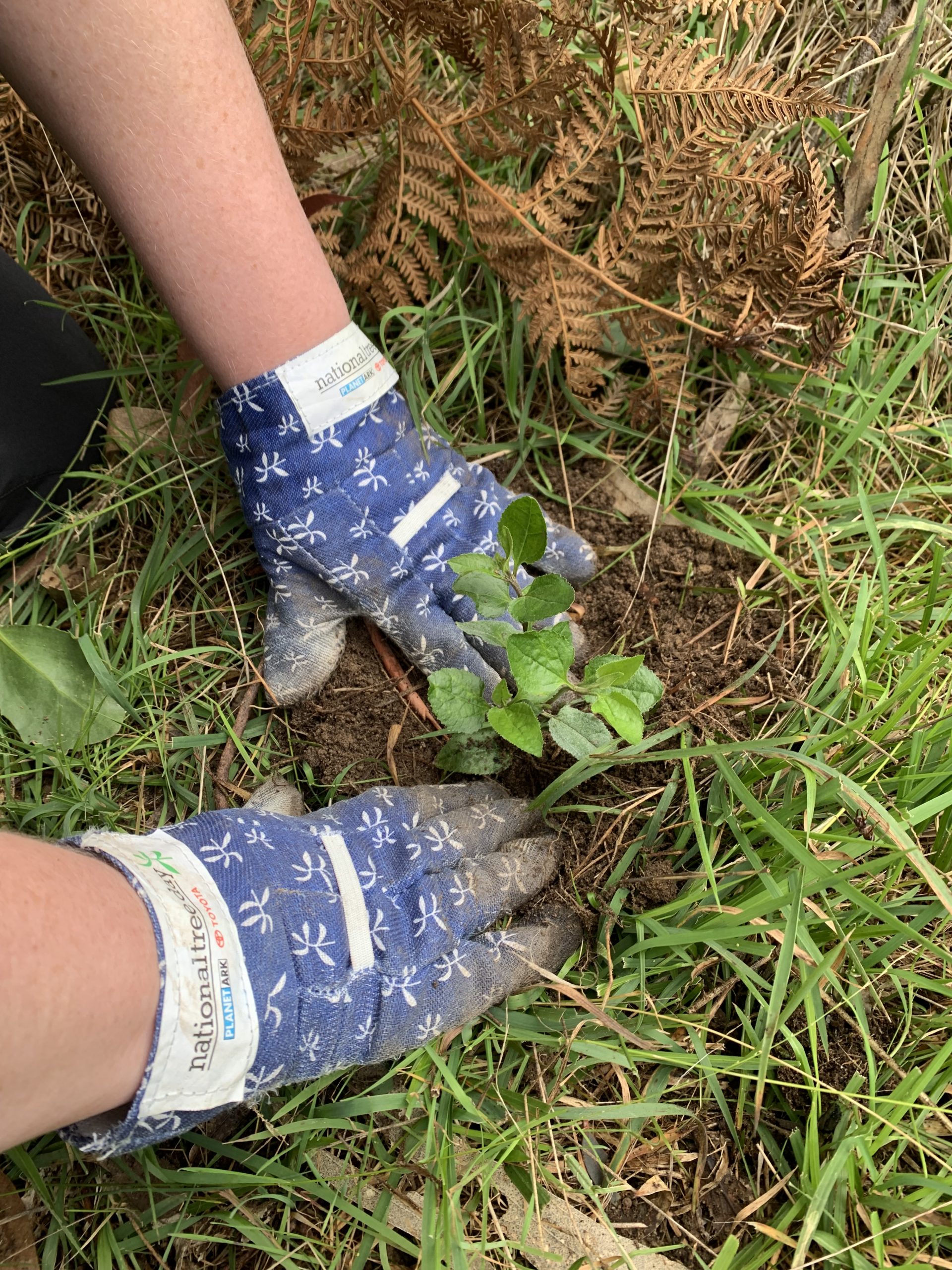
This particular site had been revegetated in 2019 but was then lost to fire during January 2020 and NBLG have been replacing plantings since. Some River Red Gums have survived, more have germinated due to the fire but very few shrubs or grasses remained. The Landcare group have been holding group working bees to add mass plantings of native plants in exclusion plots for protection from rabbits. The group planted Lightwood Wattle, Black Wattle, Yellow Box and Golden Wattle that will provide shelter and food for local native animals such as sugar gliders, brushtail possums and honeyeater birds.
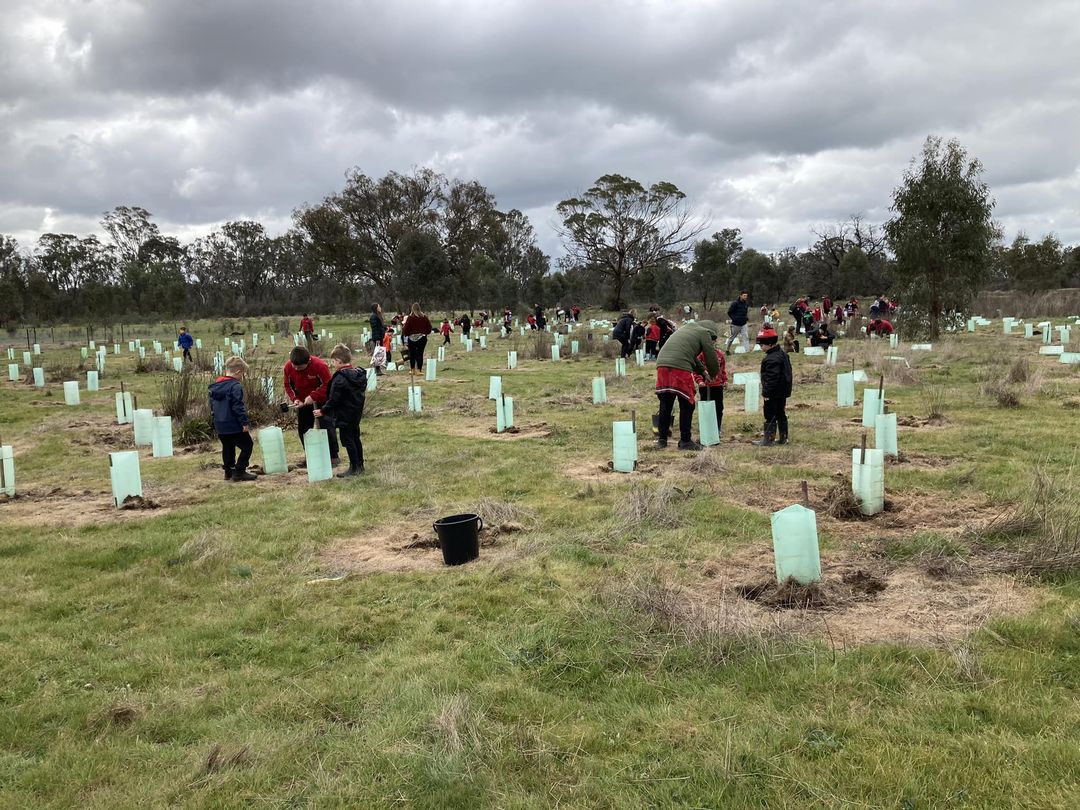
Thanks to those who all purchased trees with Fifteen Trees, this support enabled us to collaborate with a local primary school and provide a memorable outdoor learning experience for the youth of our area. We hope they’ll visit in future and admire their grown trees with pride.
Nicole Howe | Coordinator | Bendigo North Landcare
Site B | Phillip Island, VIC | 300 trees
Phillip Island is known by its Traditional Owners, the Bunurong, as Millowl. It is part of Victoria’s Kulin Nation and is steeped in a cultural history dating back tens of thousands of years. It is here that we organised the planting of 300 native trees, indigenous to the district. They included, Blue gum, Tall Sedge, Common Correa, Sheoak and Blackwood.
The island has a wealth of wildlife, the most famous being the Blue Fairy penguins. Also living there are wallabies, echidnas, kangaroos, koalas and a host of birds such as ibis, swans, plovers, sea eagles, kookaburra, galahs and honey eaters.
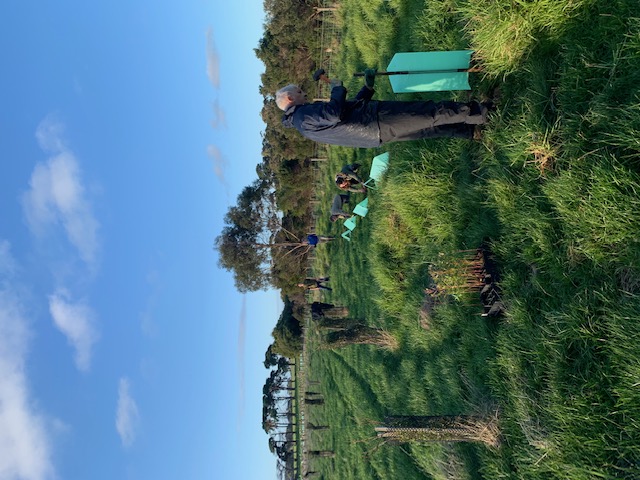
The trees will provide food and shelter for the native animals, enrich the soil, provide diversity of species to native animals and improve carbon sequestration.
Site C | Edgars Creek, VIC | 300 trees
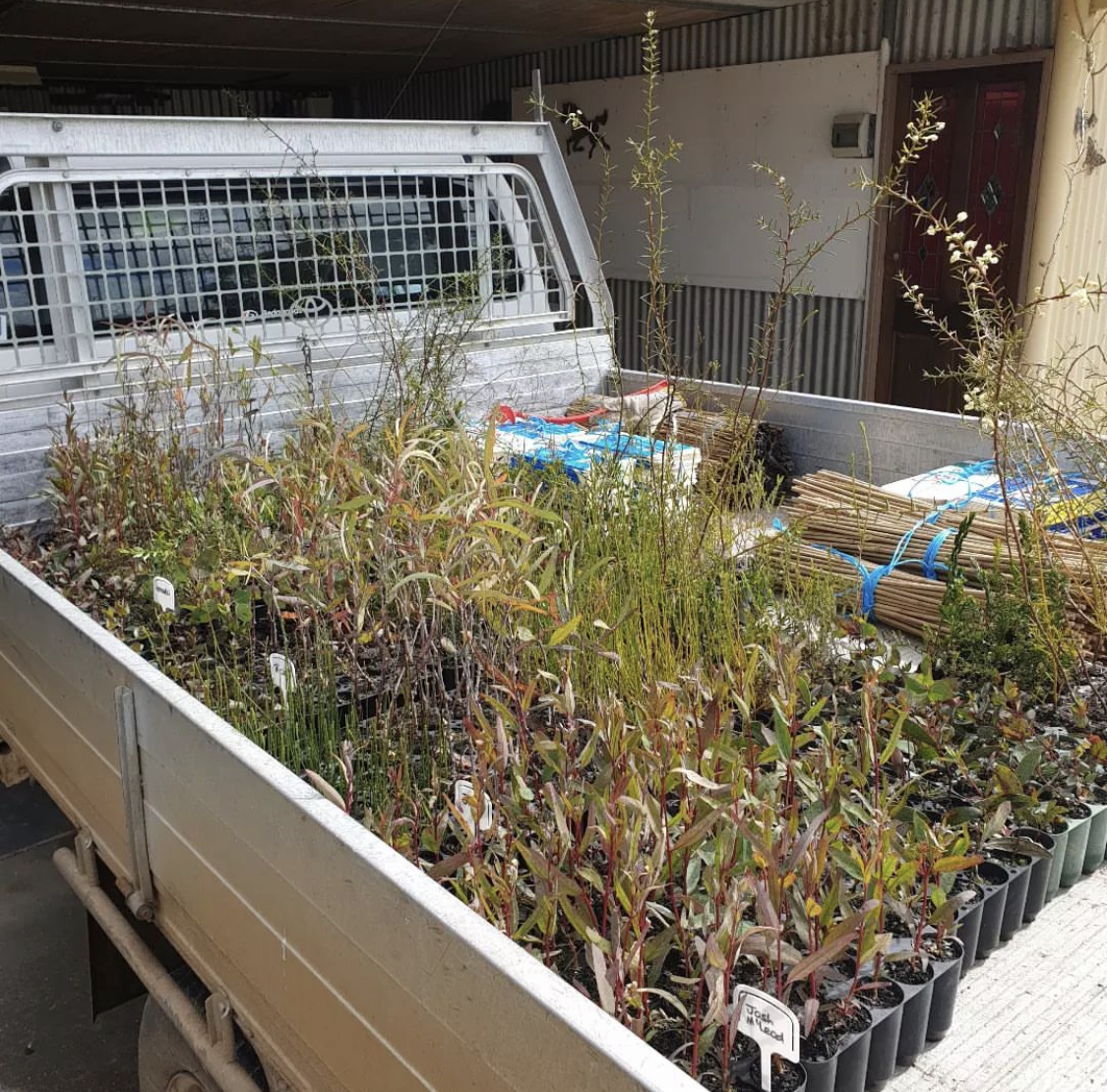
Site D | Grampians, VIC | 931 trees
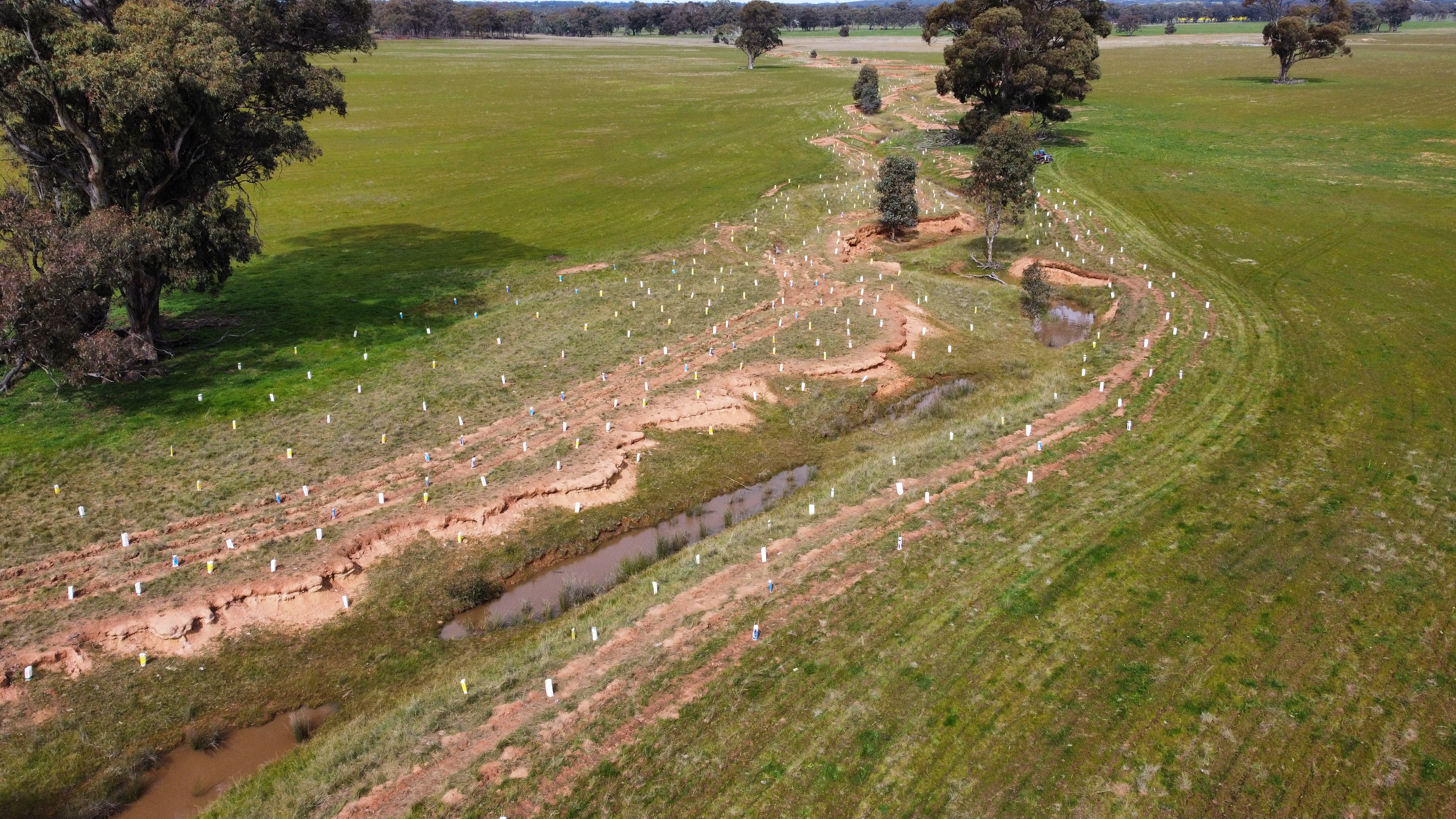
Traditionally, this would have been Buloke Woodland – home to Red Tailed Black Cockatoos (which feed on Buloke seed pods) – now very rarely seen in this district. The land was significantly cleared for agriculture and Buloke (one of the hardest woods in the world) was used as firewood and fenceposts. It’s not regarded as a particularly ‘pretty’ tree by the average farmer who also dislike it for its lack of fast development (it can take a hundred years to mature), and it readily succumbs to intensive agriculture activity. This particular site would once have been Buloke woodland. Intensive farming has caused a natural degradation and there is significant erosion. This planting of 100 trees (part of a larger planting of 900 trees) will form part of a network of habitat bio-corridors for all sorts of native animals and birds, while this and successive plantings will also alleviate the issues of erosion.
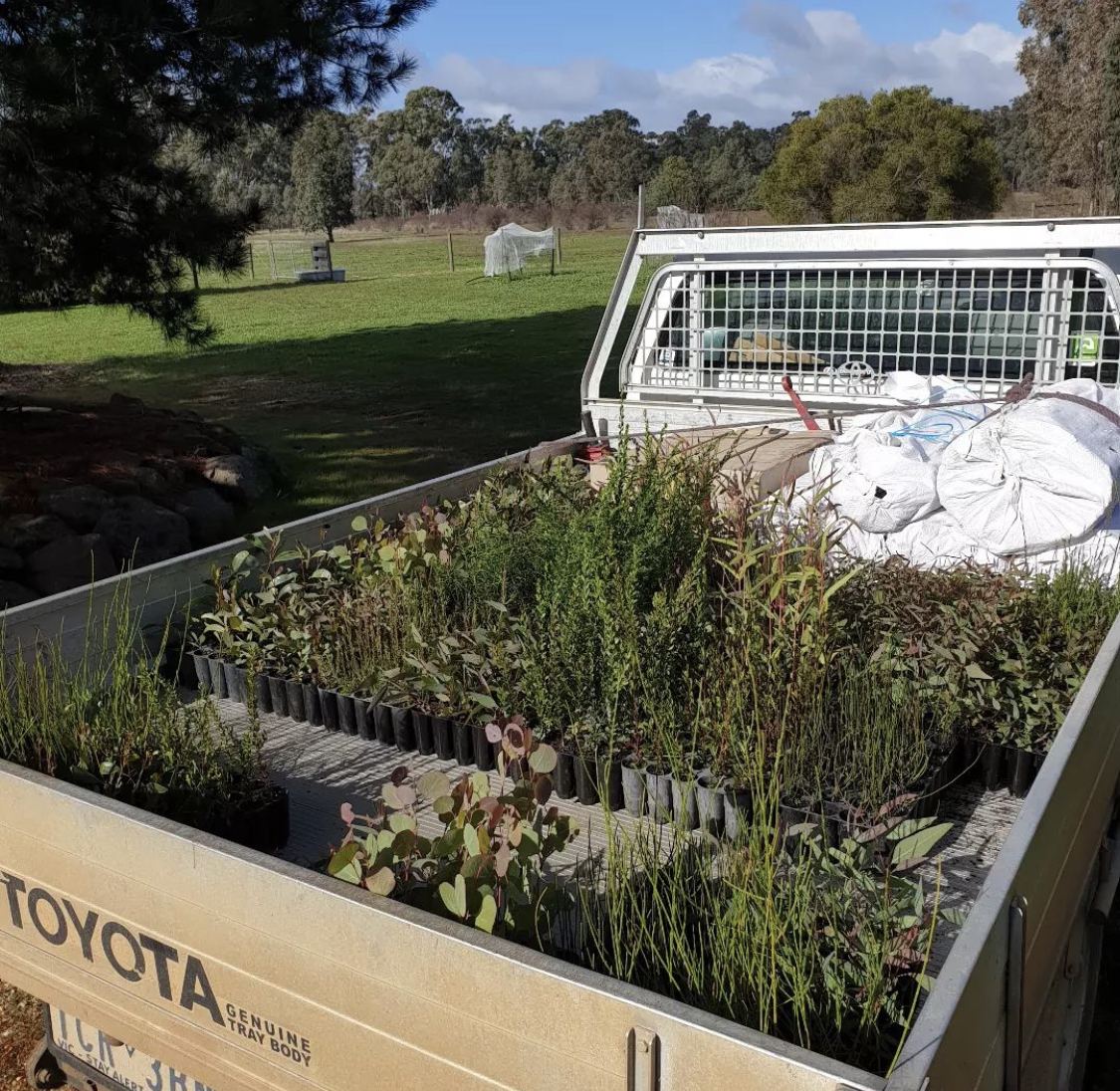
A huge thank you to the sponsors of these trees. You are helping to build habitat, fix erosion, increase soil carbon; and hopefully, together we can bring back the Black Cockatoos!
Andrew Borg | Facilitator | Buloke and Northern Grampians Landcare Network
Site D | Glendaruel Creek, VIC | 375 trees
The site is situated along the a section of the Glendaruel Creek between Mount Bolton and Mount Beckworth and is roughly 25km north west of Ballarat. The site is significant only in so far as it is just one of many degraded creeks across the Ballarat region that have been neglected for far too long. The planting area is also to complement a small revegetation project carried out by the previous owners of our property around 15 years ago.
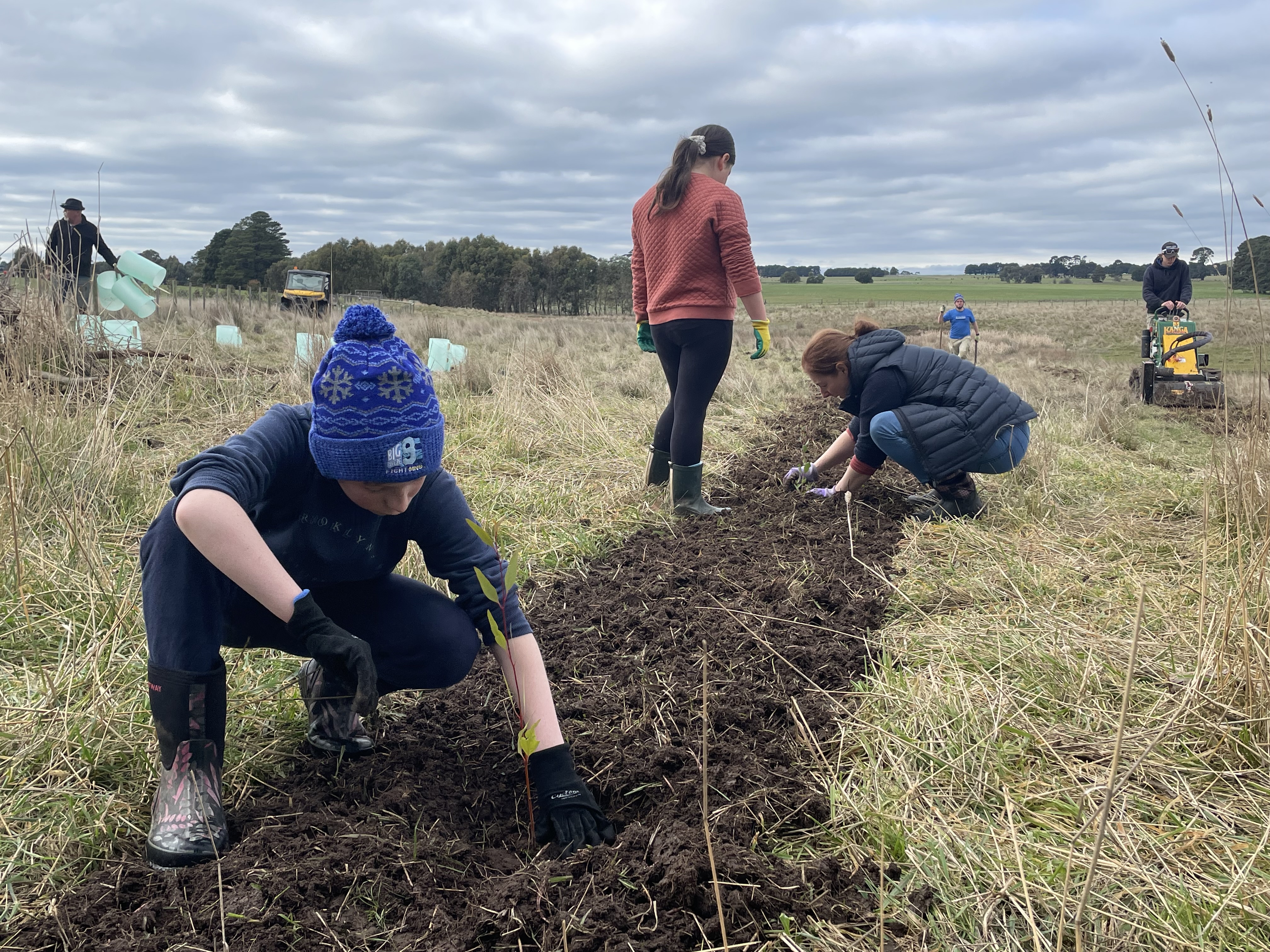
Four (4) tree species were planted: Eucalyptus camaldulensis (River Red Gum), Eucalyptus ovata (Swamp Gum), Eucalyptus viminalis viminalis (Manna Gum) and Acacia melanoxylon (Blackwood). These species were selected as in all probability these would have been the species inhabiting the immediate area prior to the land being cleared. As they grow and develop these trees will perform a variety of roles such as the stabilisation of the creek bank, they will shade the creek to allow water to stay permeant for longer, they will provide habitat, food and shelter for local fauna, they will provide a wind break from prevailing winds and increase biodiversity and biomass in the immediate area.
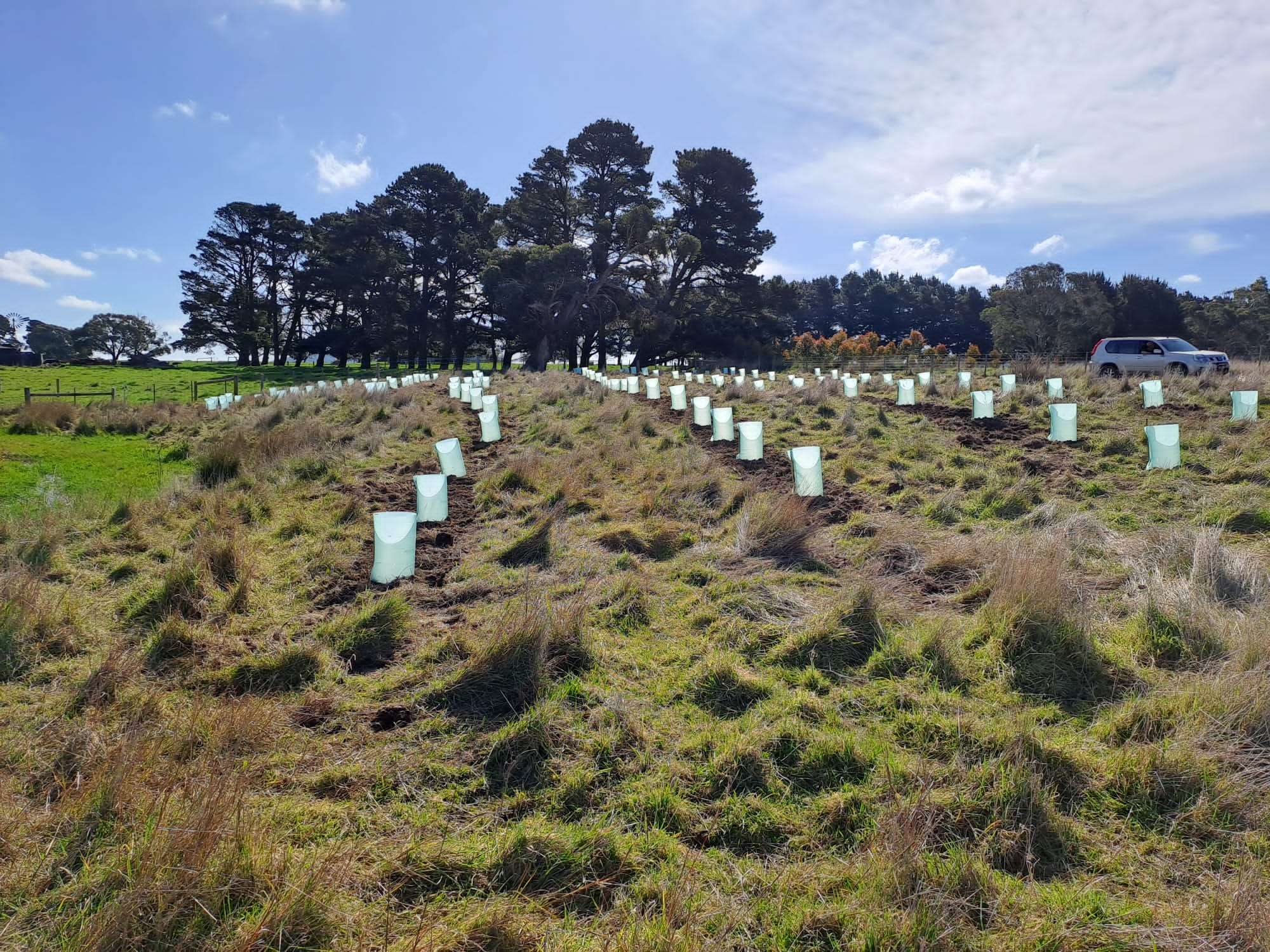
Common species sited include Magpies, Ravens, Red Wattle Birds, Yellow-tailed, Black Cockatoos, Mudlarks, Scrub Wrens, Grey Fantails, Willy Wag-tails, Galahs, Grey Sparrow Hawks, Brown Falcons, Boobook Owls and Tawney Frogmouths.
As one small group we can’t save the planet alone, but with the generosity of people like those mentioned above, who are willing to contribute financially and with the foresight of companies like Fifteen Trees, we hope that our continued relationship can make a positive environmental impact in our little corner of the world. Thanks again for your support and we look forward to working with you again in 2024.
Lachlan Andrews | Member | Glendaruel Landcare
Together, as individuals, we can make significant change. Think of people like Greta Thunberg, who went from a lone figure protesting on the steps of her parliament to the symbolic leader of a worldwide youth climate movement. Think of the social justice marches of the past few years, those rivers of people taking over our streets and calling for change. All individuals. All making a difference.
Never believe that a few caring people can’t change the world. For, indeed, that’s all who ever have.
Margaret Mead | Cultural Anthropologist
We see this very clearly here at Fifteen Trees. We have hundreds of individuals who purchase small numbers of trees, because that’s what they can do right now. But those small numbers add up to a big deal. Thousands of trees have been planted thanks to small personal gestures of generosity and forward-thinking. First a rustle, then a roar, and finally a forest.
This is the power of acting individually and working collectively. If you think you can’t make an impact, we’re here to tell you that you can. Because it’s never just you. It’s all of us, and we’re facing these challenges together.
Writers: Bronwyn Blaiklock and Colleen Filippa
Bronwyn is a multidisciplinary creative: a poet, a pianist, a reformed perfectionist. She has worked in the creative and education sectors for over 25 years. She also confesses to having an affair with an accordion, but whatever you do, don’t tell the piano. Find Bronwyn here.
With a background in Environmental Science, Colleen is the Founding Director of Fifteen Trees. In 2009, after 20 years in primary, secondary and tertiary education institutions, Colleen left the classroom to start the company. Fifteen Trees is a social enterprise assisting individuals and companies to reduce their carbon footprint by supporting community groups such as Landcare, schools and environmental networks.
RECENT TREE PLANTINGS
500 TREES PLANTED
100 TREES PLANTED
125 TREES PLANTED
SIGN UP FOR OUR MONTHLY UPDATES.
Restoring Australian ecosystems. Supporting communities with their revegetation projects for a greener and healthier planet.
Fifteen Trees acknowledges Indigenous Australians as the traditional custodians of the lands on which we work, live and play.
We recognise that Indigenous Australians have cared for and lived in harmony with this land for millennia, and their knowledge and wisdom of the land endures.
We pay our respects to Elders past, present and emerging and stand in solidarity as Indigenous Australians seek a fairer and more sustainable future for the land and its people.
